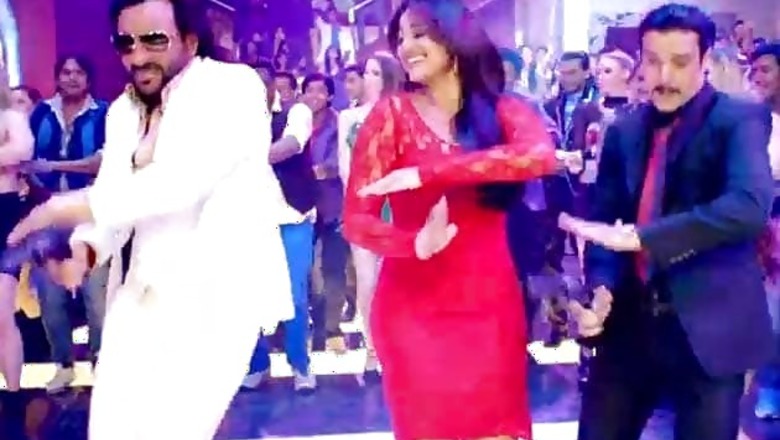
views
New Delhi: Tigmanshu Dhulia gained a lot of prominence in the Hindi film industry with his critically and commercially acclaimed films such as 'Saheb Biwi Aur Gangster' and 'Paan Singh Tomar'. The filmmaker is known to have a good grip on UP's crime underbelly. From his first film 'Haasil' to now running 'Bullett Raja', he has created characters that are sharp tongued and precise in their approach. We have compiled a list of 15 tongue-in-cheek dialogues from the film.
There are spoilers ahead, so you're advised to come back to this article after watching the film.
Don't touch my body o saiyaan, tera jala dungi main gadda aur takiyan: Though it's a part of a song, but the characters also speak it in the film. Mahie Gill is an essential part of Tigmanshu's filmography and her presence always increases the glamour quotient. This time, Saif Ali Khan was on Mahie Gill's radar.
Uttar Pradesh ki raajneeti me koi khas nahi hota, jo jaan deta hai wahi khaas hota hai: Clap-clap-clap. A film based in UP has to deal with cunning politicians at any cost. By now, Raj Babbar has become a veteran in playing a crooked politician. He says this to introduce Saif and Jimmy Sheirgill to some guests.
Padhe likhe baikat aaj kal milte kahan hain: 'Bakait' is a Hindi slang which means people who talk a lot but entertain. Basically, this was the importance of education for a politician in 'Bullett Raja'.
Tum koi mamooli sipahi nahi ho, tum ho political commando: It comes from a man who operates his business from inside a jail. He passes the election funds for big shot politicians.
I like what I am seeing: Don't go on the simplicity of this statement. In the film, it happens when an intelligent criminal spots the violent streak of Saif Ali Khan.
Dhamik mamlo me mujhe ashleelta bilkul bhi pasand nahi hai: The timing of this dialogue is simply perfect. A character wants to hear a story about a god before killing the other character. The story turns out to be obscene as per his standards, so the first character kills the other.
Inhone wahan kiya badnam ab Sata ke thoko: Those who are familiar with the popular culture of the Hindi heartland would know what it means. Sata ke thoko means kill someone from a point-blank range. It sounds even more funny when criminals utter this dialogue.
Ye operation personal hai, isme compromise ki koi gunzaaish nahi hai: You see, the criminals also have two lives, professional and personal. In personal life, they don't care who is on the other side of the table, they simply take revenge.
Apni toh maafi aur guzaarish bas yahi hai ki 'I love you': Cheesy! But, such a dialogue can generate a thunderous applause anywhere in India.
Jahan na pahuche bailgaadi wahan pahuche Maarwari: The term 'Maarwari' represents the business community here. The common perception towards a business community is that it doesn't shy away from going to distant and difficult places to make some business. Tigmanshu Dhulia is anyway known for showcasing caste politics in his films.
Ye kaun si keetab hui 'Saaye Mein Dhoop': People familiar to Hindi poet Dushyant Kumar's work would understand the meaning of this satire. Dushyant was known for his alternate-radical views on Indian politics.
Hamare yahan badla lene ki parampara hai koi corporate culture nahi jo agle deal me nuksaan adjust kar lein: An eye for an eye is the motto of Raja Mishra (Saif), the man at the helm of affairs in 'Bullett Raja', so he couldn't settle down for anything less than the enemy's head.
Pehle hote the baghi, Malkhan Singh, Mohar Singh...Paan Singh: In a way, Tigmanshu reminded the audience about his own film and a bandit who was said to be the Robin Hood of the Chambal valley.
Ajneeti aur vaishyavriti bahut prachin peshe hain, dono ka kaam shaanti banaye rakhna hai: Very objectionable dialogue? But, the Censor Board passed it and thus the director has all the rights to place it in a humorous way in the film. Though he didn't clarify what kind of 'shaanti' (peace) he was talking about.
Jab hum aayenge toh garmi thodi badh jayegi, pata chal hi jayega: This dialogue reinforces Saif's authority on the proceedings. He is shown as a cynical man who doesn't think twice before getting into a brawl.
####




















Comments
0 comment